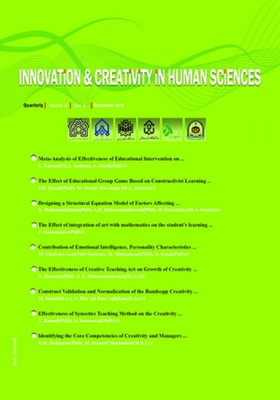Contribution of emotional intelligence, personality characteristics and demographic factors mediated by achievement motivation in explaining creativity of high school students
Subject Areas : Educational creativity-logyMaryam GhaforiAsar 1 , Malek MirHashemi 2 , Hamzeh Ganji 3
1 - دانشجوی دکتری گروه روان شناسی، واحد رودهن، دانشگاه آزاد اسلامی، رودهن،ایرانm.ghafoori1360@gmail.com
2 - دانشیار گروه روان شناسی، واحد رودهن، دانشگاه آزاد اسلامی، رودهن، ایرانmalekfd@yahoo.com
3 - استاد گروه روان شناسی، واحد رودهن، دانشگاه آزاد اسلامی، رودهن، ایرانmina.zamanii1360@yahoo.com
Keywords: motivation, Emotional intelligence, Personality traits, demographic factors, Key words: Creativity,
Abstract :
Purpose: The aim of this study was to determine the role of emotional intelligence, personality traits and demographic factors mediated by achievement motivation in explaining the creativity of high school students. Method: The population of this study consisted of all secondary school students in Hamadan in 93-92. 300 students were selected using multistage random sampling and stratified random sampling (gender as a class) and completed Torrance creativity, Shout emotional intelligence, personality (NEO), achievement motivation (HAMQ) and demographic factors questionnaires. Data were analyzed using SPSS 22. Findings: The results showed that there is a significant positive relationship between emotional intelligence and creativity. Among personality traits, extraversion and flexibility had significant positive relationship with creativity. Neuroticism has a significant negative relationship with creativity. There is not a significant relationship between agreeableness and accountability with creativity. There is a significant positive relationship between achievement motivation and creativity. Among the factors of population "economic situation of family", has about 143/0 impact on increasing students' creativity.
بهزاد پور، ابراهیم. (1382). بررسیرابطهبینانگیزشپیشرفتو ویژگیهایشخصیتیبارشداجتماعینوجوانان؛پایاننامهکارشناسیارشددانشگاه آزاد اسلامی واحد تهران مرکزی.
پینتریچ، پال آر؛ و شانگ، دیل. ایچ.(1386). انگیزش در تعلیم و تربیت (ترجمه: مهرناز شهرآرای).تهران : علم (تاریخ نشر به زبان اصلی 1968).
شریفی، حسن پاشا.(1383). رابطه خلاقیت و ویژگی های شخصیتی دانش آموزان دبیرستان های شهر تهران. فصلنامه نوآوری های آموزشی، سال 3، شماره، 7، 11-32.
تیرگری، عبدالحکیم.(1383). رابطه ساختاری هوش هیجانی با سازگاری زناشویی و تدوین و کاربرد برنامه مداخله تقویت هوش هیجانی جهت کاهش ناسازگاری زناشویی. پایان نامه دکتری چاپ نشده. رشته روانشناسی بالینی. انستیتو روانپزشکی تهران، دانشگاه علوم پزشکی ایران.
شکرکن، حسین؛ برومند، مسعود؛ نجاریان، بهمن؛ و شهنی ییلاقی، منیجه.(1381). بررسی رابطه ساده و چندگانه خلاقیت، انگیزش پیشرفت و عزت نفس با کار آفرینی در دانشجویان دانشگاه شهید چمران اهواز. مجله علوم تربیتی و روانشناسی. دوره سوم ، سال نهم- 3-4، 1-22.
جوکار، بهرام؛ البرزی، محبوبه. (1389). رابطه ویژگیهای شخصیت با خلاقیت هیجانی و خلاقیت شناختی. فصلنامه مطالعات روان شناختی.دوره 6، شماره 1، 89-110.
حسینی، افضل السادات.(1381). ماهیت خلاقیت و شیوه های پرورش آن. چاپ دوم. مشهد: آستان قدس.
رهنما، اکبر و عبدالملکی، جمال.(1388). بررسی رابطه بین هوش هیجانی و خلاقیت و پیشرفت تحصیلی در دانشجویان دانشگاه شاهد. اندیشه های نوین تربیتی روانشناختی، دوره 5، شماره 2، 55-78.
قاضی طباطبایی، محمود.(1374). مدلهای ساختار کواریانس یا مدلهای لیزرل در علوم اجتماعی. نشریه دانشکده علوم انسانی و اجتماعی، شماره 2، 43-76.
قاضی طباطبایی، محمود.(1377). فرآیند تدوین، اجرا و تفسیر ستادههای یک مدل کلی لیزرل: یک مثال عینی، سالنامه پژوهشی، شماره یکم.
مقدم، اعظم؛ نیک بخت، اکرم؛ نیک نشان، شقایق و سیادت، سیدعلی.(1387). بررسی رابطه هوش هیجانی با خلاقیت دانشجویان. مجله مطالعات روانشناسی. دوره5، شماره 1، 99-112.
نوفرستی، اعظم؛ معین الغربانی، فاطمه.(1389). بررسی رابطه بین هوش هیجانی و خلاقیت در دانشجویان. فصلنامه روانشناسی تحولی، سال 7، شماره26، 175-189.
هاشمی، سهیلا.(1388). بررسی رابطه بین هوش هیجانی و خلاقیت هیجانی و خلاقیت در دانشجویان هنر، ادبیات و علوم پایه. اندیشه های نوین تربیتی روانشناختی، دوره 5، شماره 2، 79-102.
Antonio, T., Lanawati. T. W, & Christina, L. (2014). Correlations creativity, intelligence, personality, and entrepreneurship achievement. Social and Behavioral Sciences, 115,251–257.
Annamaria, D., & Fabio, L. P. (2009). Emotional intelligence, personality traits and career decision difficulties. International Journals of Education, 9, 135–146.
Batey, M., Furnham, A. F., & Safiullina, X. (2010). Intelligence, general knowledge and personality as predictors of creativity. Learning and Individual Differences, 20, 532–535.
Eason, R., Giannangelo, M. D., & Franceschini, L. A. (2010). A look at creativity in public and private schools. Thinking Skills and Creativity, 4, 130-137.
Homayouni, A. (2011). Personality traits and emotional intelligence as predictors of learning English and math. Counseling and Guidance. 30, 839-843.
Kline, Rex B. (1998). Principles and practice of structural equation modeling. Guilford Press, New York.
Mishra, S. (2014). The relationship between creative thinking and emotional intelligence at high school students. Journal of Psychology and Behavioral Science, 2, 197-204.
Nicola, S., Schuttel, J. M., & Einar B. (2013). Increasing emotional intelligence through training: Current status and future directions. Journal of Emotional Education. Vol 5, No 1, 56-7.
Nicholls, A. (2012) Emotional intelligence tests: Potential impacts on the hiring process for accounting students. Accounting Education: An International Journal, 21(1), 75–95.
Olatoye, A. R., Akintun, S. O., & Yakasai, M. I. (2010). Emotional intelligence, creativity academic achievement of business administration students. Electronic Journal of Research in Educational Psychology, 8(2), 763-786.
Sánchez-Ruiz, M. J., Torrano, J. C., Pérez-González, M., & Petride K. V. (2011).The relationship between trait emotionalintelligence and creativity across subject domains. Journal of Motivation and Emotion, 35, 461-473.
Saemi.H. Goli, M., & Younesian. A. (2014). The effectiveness of an emotional intelligence training program and its components on the creativity and academic achievement of high school students. Journal of School Health, 1, 17-20.
Torrance،E.P. (1998).An interview with E P. Torrance: About creativity educational. Psychology Review.10, 441-452.


